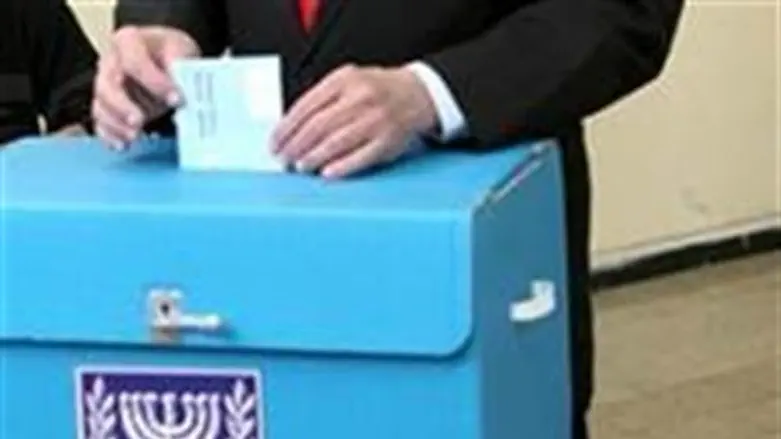
Fears were high on the both sides of the political spectrum that Yachad and Meretz would be eliminated from the Knesset yesterday. Fears had even reached Yisrael Beytenu that they would not survive, and briefly even Shas. In the end, only the Yachad faction seems to have missed the finish line of the major contenders.
This was not necessarily the expectation of Dr. Ofer Kenig, who in his head of the Forum for Political Reform in Israel with the Israel Democracy Institute (IDI). Speaking with Arutz Sheva, he spoke about how initially, there was tremendous fear that the jump in the threshold would be destabilizing for smaller Israeli political parties.
“We thought that the increase should have been taken in more moderate, gradual steps. In the past, the threshold was incrementally raised .5% at a time. We were concerned that such a drastic increase might risk keeping out small parties that represented several segments of society.
“It would not give parties enough time to adjust to the new rules.” In a January article for IDI, Kenig pointed out that the trend in Israeli politics pointed to this phenomenon amplifying. In 2013, over 268,000 votes were thrown out - a full 7.1% of people who voted. This time however, only Yachad seems to be absorbing misplaced votes.
"In retrospect, if you compare these elections to previous ones, only one party was close to passing the threshold of those that did not (Yachad) while the rest were really far behind.”
The total according to votes20.gov.il is currently just below 175,000. Were Yachad to have actually made it, then we would be seeing a dramatic turnaround on voter disenfranchisement to only tossing out about 50,000 ballots.
For Kenig, he sees that it was not fear of losing votes that drove people to vote for the larger parties, but the (misplaced) fear that they needed one party or the other to be the largest in order to make a coalition. As a result, both Labor and Likud increased their number of mandates.
"It was more of an effect of the larger parties arguing that “’We have to be the biggest party in order to form the government'”The Prime Minister and his top challenger also focused their campaigns on each other. While both accused the other of not trusting voters or misleading them, both party leaders opted out of an 8-party debate, choosing to either not be challenged by smaller parties or in Herzog's case to keep the challenge between the two of them.
"That is part of the explanation. In the end, I think Netanyahu cannibalized the Jewish Home and in a way Herzog cannibalized Yesh Atid. It was only a face-to-face battle between Herzog and Netanyahu.”
The effect of the new threshold was only evident in the early stages of the campaign, not on Election Day.
"The height of the threshold created an effect well before election night instead of the night of. There was the decision by HaTnua of whether or not to merge with Labor Party; the decision of the Arab parties to merge; Uri Ariel and Tekumah ultimately staying within the framework of the Jewish Home instead of splitting off. It also reflected in the rather small number of lists that competed."
"It pushed the political map to fewer options."
The threshold idea might have shown moderate success, but there are other ways parliaments around the world deal with electoral imbalance in order to avoid the unstable coalitions that often occur in Israel. When asked if the Greek system was an option - where the winning party was awarded a bonus 50 seats to give it the advantage in government, Kenig rushed to say it would be terrible in Israel.
"We (IDI) think there are two other reforms that are clearer alternatives that can accomplish the same goal to strengthen the largest parties and to move the political map."
"The first is to introduce electoral districts that would retain proportionality in the system," explains Kenig, but not small ones like in the United States or the United Kingdom.
"The second is to change the Basic Law in a way that would state the leader from the largest party would got the first crack at forming the government. It essentially strips away the role of the President, but it creates incentives for voters to support one of the two large parties."
When asked if that would not generate political gridlock of a different sort much like the bipartisan stagnation in the United States Congress, Kenig was certain Israelis would not allow that to happen in all their diversity.
"I don't think there will ever only be two large parties in Israel, but this idea can shift the map to 5, 6 or 7 parties with two very large parties in the middle" to anchor the system.
Isn't that the idea that Prime Minister Netanyahu has been advocating? "Early in the campaign he had a press conference and he would change the system in this direction. I think he had a certain awareness of the work we've been promoting."
